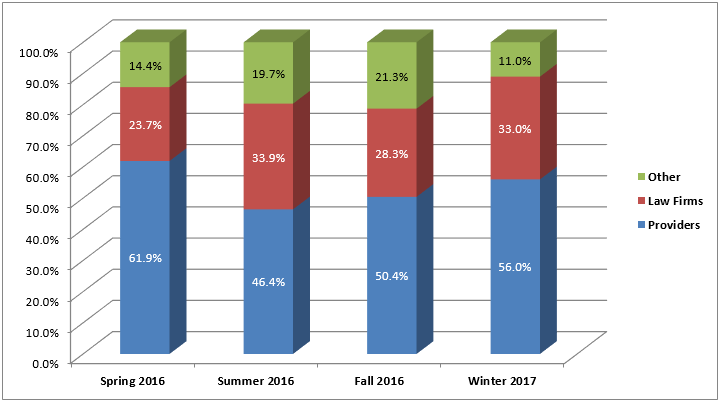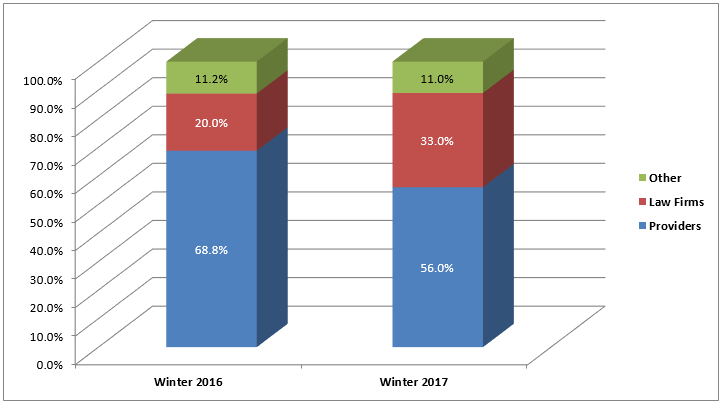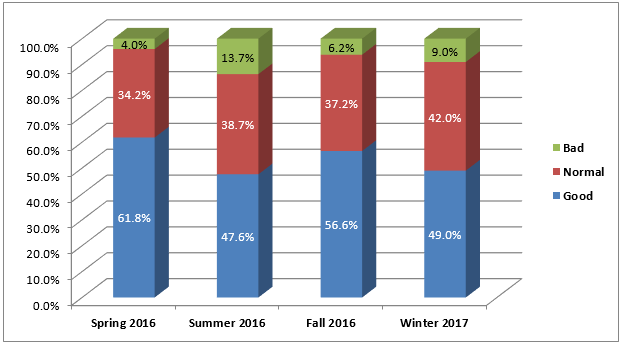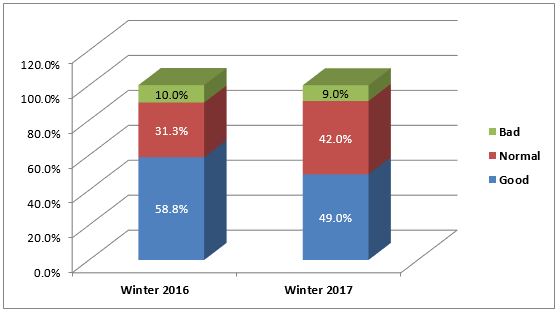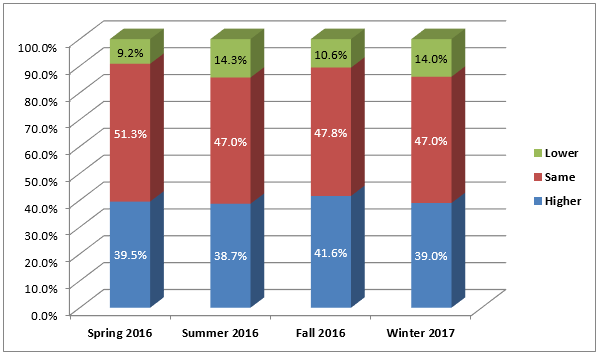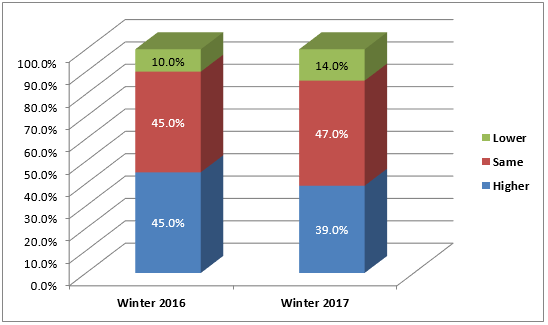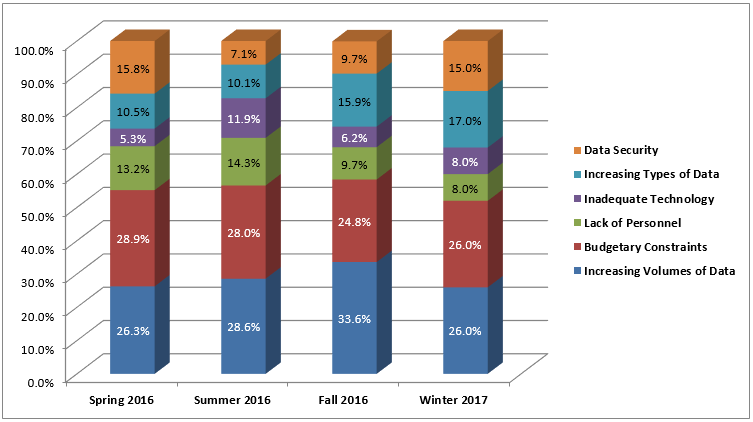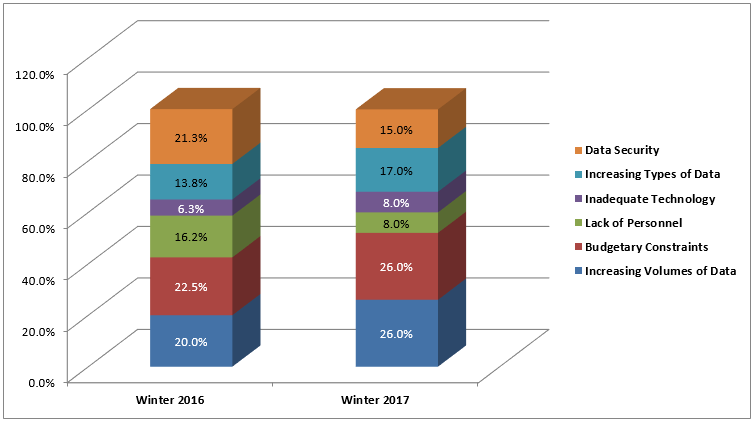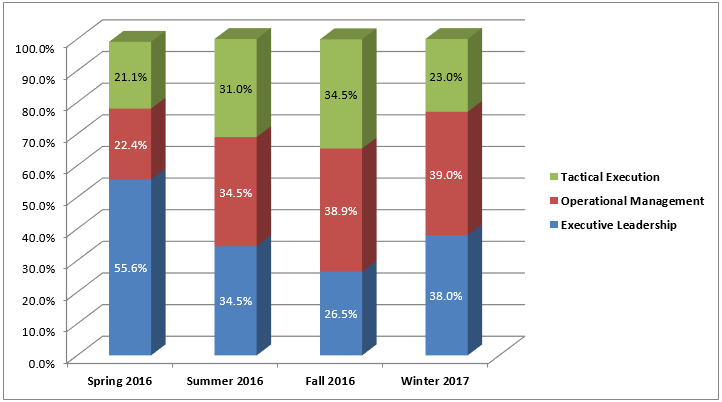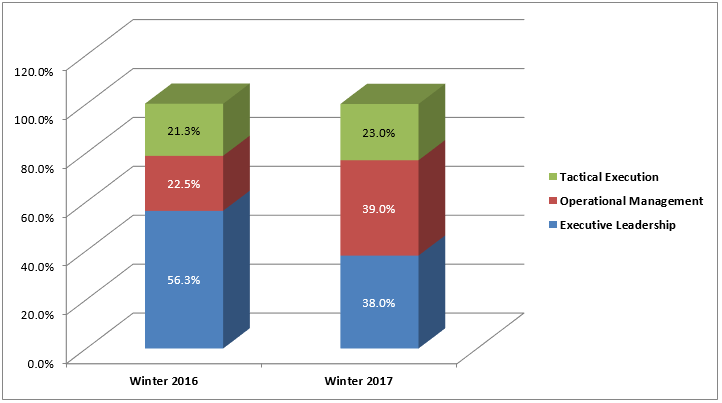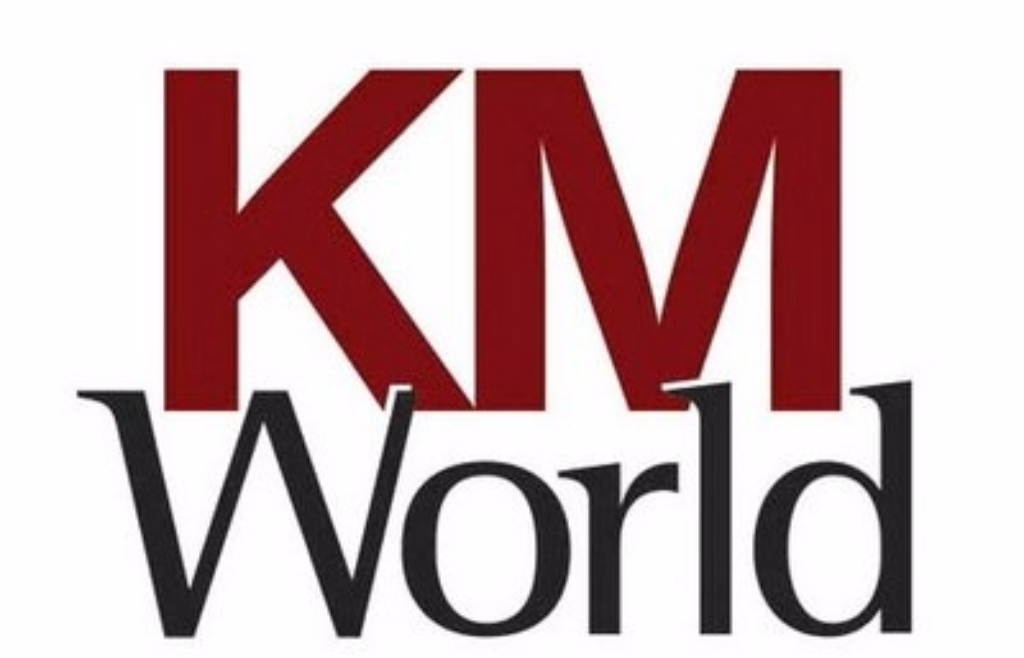As noted yesterday, LegalWeek 2017 – which includes of course the marquee event LegalTech® New York (LTNY) – is happening this week and eDiscovery Daily is here to report about the latest eDiscovery trends being discussed at the show. There’s still time to check out the show if you’re in the New York area with a number of sessions (both paid and free) available and at least 182 exhibitors providing information on their products and services.
While at the show, we will (for the seventh year in a row!) be interviewing several industry thought leaders to see what they think are the significant trends for 2017 and, which of those are evident at LTNY. After the show, we will announce the series of thought leader interviews and identify when each will be published. Mark your calendars!
American Lawyer Media (ALM) has redesigned their site so that all three days are on a single page, so you can’t really perform a “find” anymore to get the number of hits for “discovery” or “information governance” for the day. Nonetheless, based on Monday’s post, there is still plenty to talk about! Sessions in the main conference tracks include:
9:00 – 10:00 AM:
The Effects of the December 2015 Amendments to the Federal Rules of Civil Procedure from 3 Perspectives (Judges, Defense & Plaintiff)
Speakers to include: Moderator: Patrick Oot, Partner, Shook Hardy & Bacon; Panelists: Hon. Andrew J. Peck, United States Magistrate Judge, Southern District of New York, Hon. Xavier Rodriguez, United States District Judge, Western District of Texas, Hon. Elizabeth D. Laporte, United States District Court Judge, Northern District of California, Ariana Tadler, Partner, Milberg LLP, Paul D. Weiner, National eDiscovery Counsel | Shareholder, Littler Mendelson P.C.
10:30 – 11:30 AM:
The Data Privacy Landscape: Emerging Laws Affecting Cross-Border Discovery
In this session, a panel of leading eDiscovery experts will offer best practices for navigating the current state of cross-border data transfers unscathed. The panel will evaluate the impact of the General Data Protection Regulation, the EU-US Privacy Shield, blocking statutes and other data localization developments from around the globe, including in Russia, South America and the Asia-Pacific. Panelists will also review differing definitions of privacy in light of recent case law and discuss how they affect organizations’ legal obligations and suggest strategies for implementing safeguards and reducing the risks posed by these developing laws.
Speakers to include: Moderator: Drew Macaulay, Consilio; Panelists: Natascha Gerlach, Senior Attorney, Cleary Gottlieb Steen & Hamilton LLP (Brussels, Belgium), Taylor M. Hoffman, Global Head of eDiscovery Management & Senior Vice President, Swiss Re America Holding Corporation, John Davis, Executive Director and Counsel – Global eDiscovery, UBS, Catherine Castaldo, Global Chief Privacy & Data Protection Counsel, GE Capital.
5 Forces Changing Corporate eDiscovery: What Law Firms Need to Know
Corporate eDiscovery is evolving, and savvy law firms are adapting to new client demands. This session brings together inhouse and outside experts to discuss quantitative and qualitative benchmark data from dozens of interviews with AmLaw 200 firms and Fortune 500 companies. Join us for an interactive session that covers real client issues like data security, cloud consolidation, outsourcing, reporting, TAR adoption… and see how corporate legal and outside counsel are actually working with each other in the new model.
Speakers to include: Moderator: Hal Marcus, Director of Product Marketing, OpenText Discovery; Panelists: Ari Kaplan, Ari Kaplan Advisors, Rachelle Rennagel, eDiscovery Special Counsel, Pillsbury, Sharika de Freitas, Senior Manager, Discovery Solutions & Technology, Viacom, Mira Edelman, Discovery Counsel, Google.
3 Situations, 2 Lawyers, 1 Corporation: Using Relativity in a Data Breach, an Investigation & Litigation
Hypothetical scenarios with real-world Relativity workflows. Learn how a fictitious corporation in the financial services sector leverages new document review work streams to assist with three different types of hypothetical legal matters—a data breach response, an investigation, and litigation.
Speakers to include: Moderator: Cathleen Peterson, SVP – Consulting & Advanced Review Services, Kroll Ontrack; Panelist: Bernard (Brian) Hensgenbaugh, Partner, Baker Mackenzie.
1:30 – 2:30 PM:
Finding a New Safe Harbor: Using Technology and 1LR to Comply With Cross-Border Data Privacy Rules
The nullification of the U.S.-EU Safe Harbor Agreement was a shot heard around the legal world. In the vacuum created by the collapse of this framework, and with new data privacy laws continuously emerging, organizations have been struggling to determine how best to proceed with cross-border data transfers for litigation, compliance and regulatory investigations. In this panel, international e-discovery experts will discuss how various approaches to compliance, including tools such as deduplication, predictive coding, automatic redaction and anonymization.
Speakers to include: Moderator: Michael Becker, Consilio; Panelist: Jeff Nass, Senior Counsel – eDiscovery, Boehringer Ingelheim, Ashley Baynham, Partner, Brown Rudnick, Brian Corbin, Vice President & Assistant General Counsel, Legal Discovery Management, JPMorgan Chase & Co.
TAI: Technology Assisted Investigations for the Enterprise
How many lawyers does it take to investigate an email server? Analytics are a force multiplier for modern investigators, empowering lean teams to understand and review millions of documents. Join this session to learn about the expert techniques and tools used by top lawyers, data scientists, and regulators to expedite fact finding, inform decisions, and better support their clients. This session will present practical strategies and real life success stories that you can start replicating right away to find smoking gun emails—or prove the lack thereof.
Speakers to include: Moderator: Adam Kuhn, eDiscovery Attorney, OpenText Discovery; Panelists: Robert Keeling, Partner, Sidley Austin, John Davis, Executive Director and Counsel – Global eDiscovery, UBS, David Yerich, Director – eDiscovery, UnitedHealth Group, Laura Roman, E-Discovery Specialist, New York Stock Exchange, Stephen Medlock, Senior Associate, Mayer Brown.
Mobile Device Investigations: From Android to iPhone and Back
A smartphone from a key employee lands on your desk, what next? Spend 60 minutes with a mobile forensics expert and in-house counsel/IT, who will discuss various scenarios involving forensics and perform a live smartphone acquisition to help you see actual data available that might help an investigation or litigation. Questions that will be answered include: (1) What mobile device data might be helpful during litigation? (2) What common legal and IT challenges are associated with mobile forensics investigations? (3) How do mobile device investigations differ from computer investigations?
Speakers to include: Moderator: Jason Bergerson, Director of Consulting Operations, Kroll Ontrack; Panelists: Rich Robinson, eDiscovery & Information Manager, JCPenney, Michael J. Burg, Corporate Counsel, DISH Network L.L.C., Clifford E. Nichols, Senior Counsel, Day Pitney.
Cost Predictability in eDiscovery: A Real Innovation That Is Long Overdue
You have already heard it: ECA, TAR, AI and AFAs are the answers. Despite all the hype, there are legal departments that can control and predict the internal and external contributors to the total cost of eDiscovery. They are doing so in the face of typical uncontrollable variables like the number of custodians in a matter, the number of pages per document that are in a gigabyte of data, and the speed at which documents are reviewed. In this session, our experts go beyond the theoretical and will discuss their first-hand experiences in creating predictable eDiscovery budgets and reducing total eDiscovery costs.
Speakers to include: Moderator: Jamie Berry, Senior Vice President of Questio Operations, UnitedLex; Panelists: Constance Mockaitis, Senior Manager, eDiscovery, AbbVie, Jacob Herstek, Vice President and Senior Legal Counsel, HSBC Bank USA, NA, Judith Beall, Associate General Counsel & Senior Vice President, Bank of America, Ellen Blanchard, Senior Corporate Counsel, eDiscovery, T-Mobile.
3:00 – 4:00 PM:
Global Investigations and Multilingual Data – How to Manage the Risks Presented by Multilingual Datasets
Global businesses speak many languages. While conducting business in multiple languages is necessary and inevitable it also creates grave business risks as some of the most egregious and concerning compliance issues become much harder to detect. Sound risk management requires an effective approach to reviewing multilingual datasets. In this thought-provoking session, attendees will get a refreshing flavor for how delightfully complex multilingual reviews can be. The speakers will illustrate the challenges of searching multilingual data and explain workflow choices for the review of multilingual documents.
Speakers to include: Moderator: Ben Rusch, Consilio; Panelist: Farrah Pepper, Executive Counsel Discovery, General Electric Company, Mark Hjerpe, Partner, Divergent Translations.
Enough Already! Predictive Coding is for Every Matter
Machine learning isn’t just for multimillion document discovery— it’s not even just for discovery. Come learn how continuous machine learning is being used every day for litigation, investigations, due diligence and more as a natural extension of human analysis. No complicated written protocols, advanced project management, or extraordinary involvement by SMEs needed. This session will include a discussion of the latest case law, trends, and perceived “barriers”.
Speakers to include: Moderator: Hal Marcus, Director of Product Marketing, OpenText Discovery; Panelists: Ethan Ackerman, Associate, Morgan Lewis, Kiriaki Tourikis, Vice President, Associate General Counsel, JPMorgan Chase, Dawson Horn, Vice President, Associate General Counsel, AIG Corp, Alexis Mitchell, Principal Data Scientist, OpenText Discovery.
Information Governance – Hindsight is 20/20: A Moderated Debate
It’s an InfoGov showdown! Panelists will debate the merits of taking a reactive approach (“we did the best we could give the situation”) versus applying a proactive model (“you could have been better prepared if you had done this”) in a global discovery matter. This session will provide you with a playbook on how to implement a global Information Governance program, balancing against the practical constraints preventing organizations from making infogov a priority – from people that have lived through both reactive and proactive approaches to discovery.
Speakers to include: Moderator: Tom Barce, Director of Consulting Services, Kroll Ontrack; Panelists: Patrick J. Burke, Senior Counsel, Seyfarth Shaw, Ben Hubble, Manager – Records Management, Wendy’s, Jessica Escalera, Global Head of Legal Discovery Operations, Barclays.
In addition to these, there are other eDiscovery-related sessions today. For a complete description for all sessions today (and for the entire show, since they’re all on one page), click here.
So, what do you think? Are you planning to attend LTNY this year? Please share any comments you might have or if you’d like to know more about a particular topic.
Disclaimer: The views represented herein are exclusively the views of the author, and do not necessarily represent the views held by CloudNine. eDiscovery Daily is made available by CloudNine solely for educational purposes to provide general information about general eDiscovery principles and not to provide specific legal advice applicable to any particular circumstance. eDiscovery Daily should not be used as a substitute for competent legal advice from a lawyer you have retained and who has agreed to represent you.



